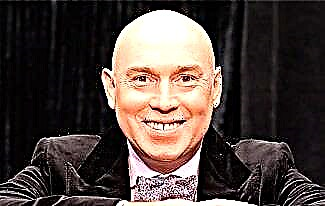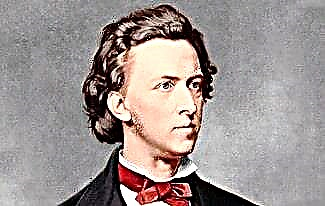Leonid Osipovich Utesov (real name Lazarus (Leyser) Iosifovich Weisbein; genus. 1895) - Russian and Soviet theater and film actor, pop singer, reader, conductor, orchestra leader, entertainer. People's Artist of the USSR (1965), who became the first pop artist to be awarded this title.
There are many interesting facts in the biography of Utesov, which we will talk about in this article.
So, before you is a short biography of Leonid Utesov.

Biography of Utesov
Leonid Utesov was born on March 10 (22), 1895 in Odessa. He grew up and was brought up in the family of a small businessman (according to other sources, a port forwarding agent) Osip Kelmanovich and his wife Malka Moiseevna. The future artist was born with a twin sister named Perlya.
Leonid (Lazar) had 8 brothers and sisters, four of whom did not live to see their majority. When he was 9 years old, his parents sent their son to the GF Faig commercial school.
According to the actor himself, he was expelled from the educational institution for a conflict with a theology teacher. When the teacher made a remark to Utyosov, he stained his clothes with chalk and ink. Around the same period of his biography, he began studying violin.
Carier start
Having reached the age of 15, the young man began his career as an artist in a big top, where he played the guitar, transformed into a clown and even performed acrobatic acts. It was then that he took the pseudonym "Leonid Utesov", under which he became known throughout the world.

The guy needed the pseudonym at the request of the management. Then he decided to come up with a surname for himself, which no one had heard before. In 1912 he was admitted to the troupe of the Kremenchug Theater of Miniatures, and the next year he entered the Odessa troupe of K. G. Rozanov.
After that, Utyosov performed on the stages of many miniature theaters until he was drafted into the army. Returning home, he took 1st place in the competition of couplets in Gomel.
Feeling confident in his own abilities, Leonid went to Moscow, where he managed to assemble a small orchestra and perform with it in the Hermitage garden. At the height of the Civil War, he toured different cities, playing comedy characters in performances.
An interesting fact is that according to the statements of some biographers, the patron of Leonid Utyosov was the famous crime boss - Mishka Yaponchik. It is worth noting that in one of his autobiographical books, the artist spoke very flatteringly about Yaponchik.
Theater and films
On the theatrical stage, Utyosov began performing at a young age. During his life, he played about 20 roles, transforming into various characters. At the same time, roles in operettas were very easy for him.
Leonid appeared on the big screen in 1917, playing the lawyer Zarudny in the film The Life and Death of Lieutenant Schmidt. After 5 years, viewers saw him in the form of Petliura in the painting Trading House "Antanta and Co".
Real fame came to him in 1934, after participating in the musical comedy "Merry Guys", in which the inimitable Lyubov Orlova also starred.
An interesting fact is that a few months before the premiere of the film, for politically sharp poems and parodies, its scriptwriters - Nikolai Erdman and Vladimir Mass were sent into exile, as a result of which their names were removed from the credits.

During the Great Patriotic War (1941-1945), Leonid Utyosov often toured with his orchestra in different cities to raise the fighting spirit of Soviet soldiers. In 1942, the musical "Concert to the Front" was very popular, in which he performed many songs. Then he was awarded the title of "Honored Artist of the RSFSR".
In 1954, Utyosov staged the play "Silver Wedding". By the way, the man showed much more interest in theater than in cinema. For this reason, most of the films with his participation are documentary.
In 1981, due to heart problems, Leonid Osipovich decided to leave the stage. In the same year, the last television project, Around Laughter, was shot with the participation of the artist.
Music
Many people remember Leonid Utyosov first of all as a pop singer, capable of performing songs in different genres from jazz to romance. In 1928 he was lucky enough to visit Paris for a jazz concert.
Utesov was so impressed by the orchestra's performance that upon his arrival in Leningrad he founded his own Tea-Jazz. Soon he presented a theatrical jazz program based on the works of Isaac Dunaevsky.

It is curious that the audience can see almost all the musicians of Leonid Osipovich's orchestra in the "Merry Boys". It was in this tape that the famous song "Heart" sounded, performed by the artist, which even today can be heard periodically on radio and TV.
In 1937 Utyosov presented a new program, Songs of My Motherland, entrusting his daughter Edith to perform as a soloist in his orchestra. A couple of years later, he became the first Soviet singer to star in a video. During the war years, he, together with the team, performed military-patriotic compositions.
In the early 50s, Edith decided to leave the stage, and 10 years later, Leonid Utesov himself followed her example. Over the years of his creative biography, he performed hundreds of songs, becoming in 1965 People's Artist of the USSR.
The most famous were such compositions as "From the Odessa kichman", "Bublikki", "Gop with a closure", "At the Black Sea", "Moscow windows", "Odessa Mishka" and many others. The discography of the artist's selected songs includes over a dozen albums.
Personal life
The first official wife of Utesov was actress Elena Iosifovna Goldina (also known under the pseudonym Elena Lenskaya), with whom he legalized relations in 1914. In this union, daughter Edith was born.
The couple lived together for 48 years, until the death of Elena Iosifovna in 1962. By that time in his biography, Leonid had been in close relations with the dancer Antonina Revels for a long time, who in 1982 became his second wife.
It so happened that Utesov survived his daughter Edith, who died in 1982. The woman's cause of death was leukemia. According to some sources, Leonid Osipovich had illegitimate children from different women, but there are no reliable facts confirming such statements.
Death
Leonid Utesov died on March 9, 1982 at the age of 86, having outlived his daughter by a month and a half. After himself, he left 5 autobiographical books, in which he described different periods of his personal and creative life.
Utesov Photos
















